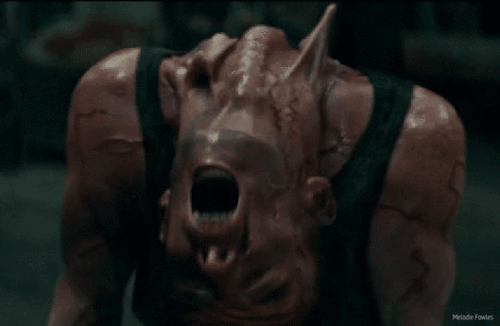
If you went into Overlord totally blind, from the get-go, you might think you were watching a war-set action film with a moderate amount of action, or a war-set period drama made by people not that indebted to historical accuracy nor dedicated to a sense of meaningful purpose. After an explosive opening, leaving a small squad of soldiers marooned in a small French town under Nazi rule, you might wonder just what the point of anything is, and when anything might happen. That may not sound like high praise, but being that Overlord is actually a horror flick (with action elements), it forces you to reevaluate the pace at which it unfolds. Soon, you’ll begin to respect how it methodically reveals something deeply disturbing and dangerous in the bowels of the old church where a Nazi stronghold has been established, and which a small group of American soldiers must destabilize as their only mission.
The first act, following its chaotic opening, is dedicated entirely to intrigue, peppered with drips and drabs alluding to what the Nazis are doing in their laboratory/dungeon. During this time, the film allows us to get to know our characters, determine the relationships they share, become accustomed to at least a basic history of World War II, and simply appreciate that we’re being treated to a genre period piece, which never happens in mainstream cinema. If you go into Overlord expecting a horrific spectacle from the first frame to the last, you may be checking your watch, but if you go in knowing that the film wants you to earn that fictionalized horror by making you experience the historical, real-life horror first, Overlord will earn your respect.

Overlord is very attractively shot , despite all the nastiness that’s soon to come, with the production design going far to make Overlord feel as vintage as possible, while also dabbling with some slight steampunk influences. More importantly, it knows that it exists in the shadows of other classic World War II epics like Saving Private Ryan, and certain character archetypes (including one of their fates) is informed by this. To get into slightly spoilery material, one soldier suffers a fatal spray of gunfire to the chest, and the medic rolls up his shirt to see the damage, revealing too-realistic bullet wounds leaking endless rivers of blood no matter how much someone tries to wipe it away. This is the fate that befalls Giovanni Ribisi’s Medic Wade in Saving Private Ryan, and the scene is purposely staged in the same way, only now Overlord offers a twist…the mysterious serum culled from the Nazi laboratory, and the strange things it can do to dead flesh…
The cast do excellent work, anchored by leads Jovan Adepo as Private Boyce and Kurt Russell offspring Wyatt Russell as Corporal Ford, who finds himself the defacto leader of the squad after…let’s call it a major mishap. Both excel in their roles, with Russell easily stepping into that no-nonsense, humorless tough guy role that Clint Eastwood handily turned into an archetype. (In fact, it was during a pivotal scene during the third act between our two leads that made me realize that, in all this discussion regarding the upcoming remake of Escape From New York, the perfect person to take on the mantle of Snake Plissken would be Kurt Russell’s own son.) And as such, every good horror romp needs a towering villain, and that belongs to Dr. Wafner (Pilou Asbæk), who is monstrous enough simply as a “human being” before his character goes in a very different direction. (As an aside, Avery admits in the supplements that Overlord doesn’t quite follow the history book when it comes to its casting, as he admits there were no African-American paratroopers in World War II, despite casting three black actors in the squad. However, as he was right to point out, in a movie about Nazis creating monstrous super soldiers from dead bodies, the audience should already be in the right frame of mind to allow just a bit more suspension of disbelief.)

Overlord also has substance, vying to be more than just a B-movie style Nazi smash-‘em-up. In the midst of this monster movie, director Julius Avery includes tough questions for the characters and the audience to question, especially during one scene in particular that sees Russell’s Ford very aggressively “interrogating” the Wafner character, whom we have seen commit awful acts on screen. Avery executes the scene so well that this easy idea of black and white starts to go away, leaving us to wonder what’s too far to go to complete a mission, and how low do the heroes have to stoop before they become just as bad as their enemy?
Following the end of World War II, it didn’t take very long for distributors to begin turning to the Nazi as their go-to horror movie villain, beginning with a brief run of exploitation flicks from the ‘60s and ‘70s before transitioning into more straightforward (and sometimes goofy) horror spectacles. The trend continues to this day in seemingly every Call Of Duty installment ever and an array of questionable looking direct-to-video titles. In spite of being a real-life horrifying subject, the atrocities committed by Nazi Germany and their exploration into the dark arts and occultism almost write their own horror-based material. We’ve seen Nazi zombies aplenty over the years, from 1977’s Shockwaves to 2008’s very underrated Outpost (which treads similar ground as Overlord, but on a budget), and the trend will likely continue for some time. It’s doubtful, however, that one will be as well-made, violent, and even thoughtful, while still appealing to mainstream theater audiences, as Overlord.








